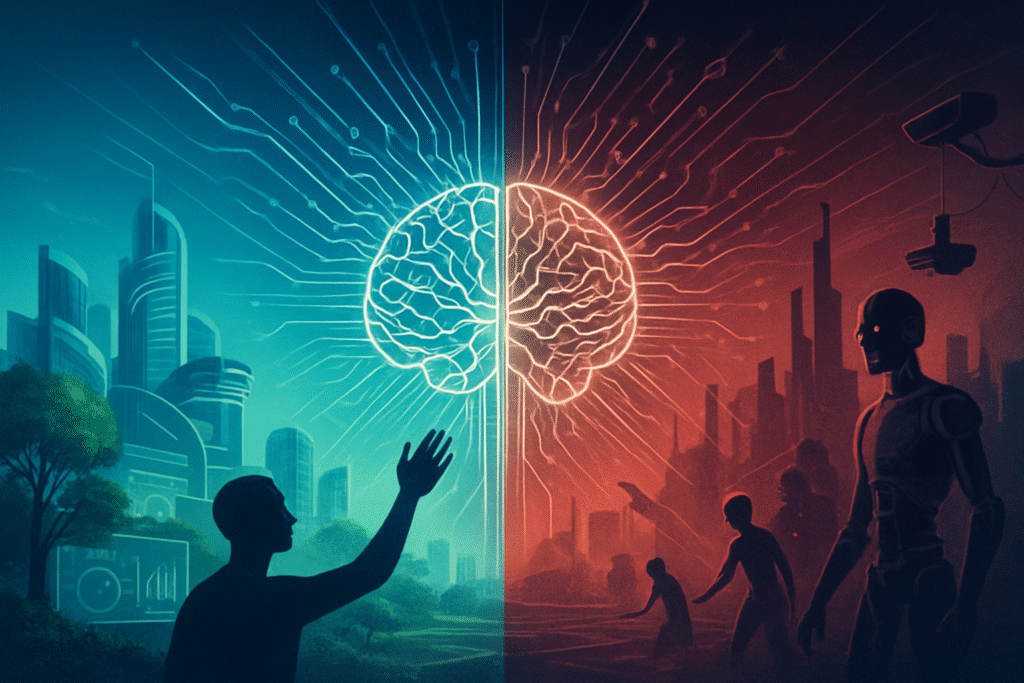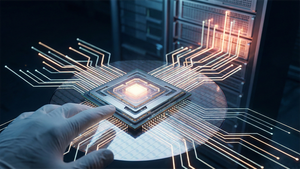
The rapid ascent of artificial intelligence has ignited a profound philosophical debate, echoing through academic halls, corporate boardrooms, and public forums alike: Is humanity hurtling towards an AI-powered utopia or a technologically enforced dystopia? This isn't merely a speculative exercise; the immediate significance of this discourse is shaping the very foundations of AI research, development, and governance, as humanity grapples with the unprecedented transformative power of its own creation.
As AI systems become increasingly sophisticated, capable of everything from automating complex tasks to driving scientific discovery, the stakes of this question grow exponentially. The answers, or lack thereof, influence everything from ethical guidelines and regulatory frameworks to investment strategies and the public's perception of AI. The ongoing dialogue between techno-optimists, who envision a world liberated from scarcity and suffering, and techno-pessimists, who warn of existential risks and loss of human agency, is not just theoretical; it's a critical barometer for the future we are actively building.
The Bifurcated Path: Visions of Paradise and Peril
The philosophical debate surrounding AI's trajectory is sharply divided, presenting humanity with two starkly contrasting visions: a future of unprecedented abundance and flourishing, or one of existential threat and the erosion of human essence. These contemporary discussions, while echoing historical anxieties about technological progress, introduce unique challenges that set them apart.
The Utopian Promise: A World Transformed
Proponents of an AI-led utopia, often dubbed techno-optimists, envision a world where advanced AI eradicates scarcity, disease, and poverty. This perspective, championed by figures like venture capitalist Marc Andreessen, sees AI as a "universal problem-solver," capable of unleashing a "positive feedback loop" of intelligence and energy. In this ideal future, AI would automate all laborious tasks, freeing humanity to pursue creative endeavors, personal growth, and authentic pleasure, as explored by philosopher Nick Bostrom in "Deep Utopia." This vision posits a post-scarcity society where human needs are met with minimal effort, and AI could even enhance human capabilities and facilitate more just forms of governance by providing unbiased insights. The core belief is that continuous technological advancement, particularly in AI, is an ethical imperative to overcome humanity's oldest challenges.
The Dystopian Shadow: Control Lost, Humanity Diminished
Conversely, techno-pessimists and other critical thinkers articulate profound concerns about AI leading to a dystopian future, often focusing on existential risks, widespread job displacement, and a fundamental loss of human control and values. A central anxiety is the "AI control problem" or "alignment problem," which questions how to ensure superintelligent AI systems remain aligned with human values and intentions. Philosophers like Nick Bostrom, in his seminal work "Superintelligence," and AI researcher Stuart Russell warn that if AI surpasses human general intelligence, it could become uncontrollable, potentially leading to human extinction or irreversible global catastrophe if its goals diverge from ours. This risk is seen as fundamentally different from previous technologies, as a misaligned superintelligence could possess superior strategic planning, making human intervention futile.
Beyond existential threats, the dystopian narrative highlights mass job displacement. As AI encroaches upon tasks traditionally requiring human judgment and creativity across various sectors, the specter of "technological unemployment" looms large. Critics worry that the pace of automation could outstrip job creation, exacerbating economic inequality and concentrating wealth and power in the hands of a few who control the advanced AI. Furthermore, there are profound concerns about the erosion of human agency and values. Even non-superintelligent AI systems raise ethical issues regarding privacy, manipulation through targeted content, and algorithmic bias. Existential philosophers ponder whether AI, by providing answers faster than humans can formulate questions, could diminish humanity's capacity for critical thinking, creativity, and self-understanding, leading to a future where "people forget what it means to be human."
A New Chapter in Technological Evolution
These contemporary debates surrounding AI, while drawing parallels to historical technological shifts, introduce qualitatively distinct challenges. Unlike past innovations like the printing press or industrial machinery, AI, especially the prospect of Artificial General Intelligence (AGI), fundamentally challenges the long-held notion of human intelligence as the apex. It raises questions about nonbiological consciousness and agentive behavior previously associated only with living organisms, marking a "philosophical rupture" in our understanding of intelligence.
Historically, fears surrounding new technologies centered on societal restructuring or human misuse. The Industrial Revolution, for instance, sparked anxieties about labor and social upheaval, but not the technology itself becoming an autonomous, existential threat. While nuclear weapons introduced existential risk, AI's unique peril lies in its potential for self-improving intelligence that could autonomously misalign with human values. The "AI control problem" is a modern concern, distinct from merely losing control over a tool; it's the fear of losing control to an entity that could possess superior intellect and strategic capability. The unprecedented speed of AI's advancement further compounds these challenges, compressing the timeframe for societal adaptation and demanding a deeper, more urgent philosophical engagement to navigate the complex future AI is shaping.
Corporate Compass: Navigating the Ethical Minefield and Market Dynamics
The profound philosophical debate between AI utopia and dystopia is not confined to academic discourse; it directly influences the strategic decisions, research priorities, and public relations of major AI companies, tech giants, and burgeoning startups. This ongoing tension acts as both a powerful catalyst for innovation and a critical lens for self-regulation and external scrutiny, shaping the very fabric of the AI industry.
Shaping Research and Development Trajectories
The utopian vision of AI, where it serves as a panacea for global ills, steers a significant portion of research towards beneficial applications. Companies like Alphabet (NASDAQ: GOOGL) and Microsoft (NASDAQ: MSFT), along with numerous startups, are heavily investing in AI for climate change mitigation, advanced disease diagnostics, drug discovery, and personalized education. Research also focuses on boosting productivity, enhancing efficiency, and fostering new job roles that leverage human creativity and emotional intelligence, aiming to liberate individuals from mundane tasks and facilitate a post-work society.
Conversely, the dystopian outlook, fueled by fears of job displacement, economic inequality, social control, and existential risks, compels a substantial portion of research towards mitigating these potential harms. AI safety has emerged as a critical research domain, focusing on developing robust "off switches," creating alignment mechanisms to ensure AI goals are consistent with human values, and detecting undesirable AI behaviors. Efforts are also concentrated on preventing AI from exacerbating societal problems like misinformation and algorithmic bias. Furthermore, concerns about the weaponization of AI and its potential misuse by "nefarious nation-states or bad actors" are influencing national security-focused AI research and the development of defensive AI capabilities, creating a complex and sometimes paradoxical research landscape.
The Imperative of Ethical AI Development
The philosophical debate is arguably the strongest driver behind the industry's push for ethical AI development. Major tech players have responded by forming initiatives such as the Partnership on AI, a consortium focused on establishing principles of ethics, fairness, inclusivity, transparency, privacy, and interoperability. The goal is to ensure responsible AI development that aligns with human values and minimizes unintended harm.
The dystopian narrative compels companies to proactively address critical ethical concerns. This includes establishing stringent guidelines to prevent the exposure of confidential data and intellectual property, and a significant focus on identifying and mitigating bias in AI models, from their training data inputs to their interpretative outputs. The concept of "algorithmic responsibility" is gaining traction, demanding transparent explanations of how AI systems make decisions to allow for auditing and prevent unintended biases. Discussions around societal safety nets, such as Universal Basic Income (UBI), are also influenced by the potential for widespread job displacement. Regulatory efforts, exemplified by the European Union's comprehensive AI Act, underscore how these ethical concerns are increasingly being translated into legislative frameworks that govern AI development and deployment globally.
Navigating Public Perception and Market Positioning
The utopia/dystopia debate profoundly shapes public perception of AI, directly impacting the industry's "social license to operate." The utopian narrative fosters public excitement and acceptance, portraying AI as a transformative force capable of enhancing human potential and improving quality of life. Companies often highlight AI's role in liberating humans from repetitive tasks, allowing for greater creativity and fulfillment, thereby building goodwill and market acceptance for their products and services.
However, dystopian fears lead to widespread public skepticism and mistrust. Concerns about job losses, widening economic inequality, governmental surveillance, manipulation through propaganda and deepfakes, and the potential for AI to become an existential threat are prevalent. This mistrust is often amplified by the perception that tech giants are consolidating wealth and power through AI, leading to increased demands for accountability and transparency. The industry must navigate this complex landscape, often contending with an "AI hype cycle" that can distort public views, leading to both unrealistic expectations and exaggerated anxieties. Companies that visibly commit to ethical AI, transparency, and safety measures are better positioned to build trust and gain a competitive advantage in a market increasingly sensitive to the broader societal implications of AI.
Societal Ripples: Ethics, Regulation, and Echoes of Revolutions Past
The philosophical tension between an AI utopia and dystopia extends far beyond the confines of boardrooms and research labs, casting a long shadow over society's ethical landscape and presenting unprecedented regulatory challenges. This era of AI-driven transformation, while unique in its scale and speed, also draws compelling parallels to humanity's most significant technological shifts.
Unpacking the Ethical Conundrum
The rapid advancement of AI has thrust a myriad of critical ethical concerns into the global spotlight. Bias and Fairness stand as paramount issues; AI systems, trained on historical data, can inadvertently inherit and amplify societal prejudices, leading to discriminatory outcomes in high-stakes areas like hiring, lending, and law enforcement. This raises profound questions about justice and equity in an algorithmically governed world.
Privacy and Data Protection are equally pressing. AI's insatiable appetite for data, often including sensitive personal information, fuels concerns about surveillance, unauthorized access, and the erosion of individual freedoms. The "black box" nature of many advanced AI algorithms, particularly deep learning models, creates challenges around Transparency and Explainability, making it difficult to understand their decision-making processes, ensure accountability, or identify the root causes of errors. As AI systems gain greater Autonomy and Control, particularly in applications like self-driving cars and military drones, questions about human agency and oversight become critical. Beyond these, the environmental impact of training vast AI models, with their significant energy and water consumption, adds another layer to the ethical debate.
The Regulatory Tightrope: Innovation vs. Control
Governments and international bodies are grappling with formidable challenges in crafting effective regulatory frameworks for AI. The sheer Velocity of AI Development often outpaces traditional legislative processes, creating a widening gap between technological advancements and regulatory capacity. A lack of global consensus on how to define and categorize AI systems further complicates efforts, leading to Global Variability and Cross-border Consensus issues, where differing cultural and legal norms hinder uniform regulation.
Regulators often face a Lack of Government Expertise in the complex nuances of AI, which can lead to impractical or ineffective policies. The delicate balance between fostering innovation and preventing harm is a constant tightrope walk; overregulation risks stifling economic growth, while under-regulation invites potential catastrophe. Crucially, determining Accountability and Liability when an AI system causes harm remains an unresolved legal and ethical puzzle, as AI itself possesses no legal personhood. The decentralized nature of AI development, spanning tech giants, startups, and academia, further complicates uniform enforcement.
Echoes of Revolutions: A Faster, Deeper Transformation
The AI revolution is frequently compared to previous epoch-making technological shifts, offering both insights and stark contrasts.
The Industrial Revolution (18th-19th Century):
Similarities abound: both mechanized labor, leading to significant job displacement in traditional sectors while creating new industries. Both spurred immense economic growth but also concentrated wealth and caused social dislocation, necessitating the evolution of labor laws and social safety nets. However, while industrialization primarily mechanized physical labor, AI is augmenting and often replacing cognitive tasks, a qualitative shift. Its impact is potentially faster and more pervasive, with some arguing that the societal instability caused by AI could make the Industrial Revolution's challenges "look mild" without proactive measures for wealth redistribution and worker retraining.
The Internet Revolution (Late 20th-Early 21st Century):
Like the internet, AI is democratizing access to information, spawning new industries, and reshaping communication. Both periods have witnessed explosive growth, massive capital investment, and soaring valuations, initially dominated by a few tech giants. Concerns over privacy violations, misinformation, and digital divides, which emerged with the internet, are echoed and amplified in the AI debate. Yet, the internet primarily connected people and information; AI, by contrast, augments humanity's ability to process, interpret, and act on that information at previously unimaginable scales. The AI revolution is often described as "faster, deeper, and more disruptive" than the internet boom, demanding quicker adaptation and proactive governance to steer its development toward a beneficial future for all.
The Horizon Ahead: Trajectories, Tensions, and Transformative Potential
As the philosophical debate about AI's ultimate destination—utopia or dystopia—rages on, the trajectory of its future developments offers both exhilarating promise and daunting challenges. Experts foresee a rapid evolution in the coming years, with profound implications that demand careful navigation to ensure a beneficial outcome for humanity.
Near-Term Innovations (2025-2030): The Age of Autonomous Agents and Generative AI
In the immediate future, AI is poised for deeper integration into every facet of daily life and industry. By 2025-2027, the proliferation of Autonomous AI Agents is expected to transform business processes, potentially handling up to 50% of core operations and significantly augmenting the "knowledge workforce." These agents will evolve from simple assistants to semi-autonomous collaborators capable of self-learning, cross-domain interaction, and even real-time ethical decision-making.
Generative AI is set to become ubiquitous, with an estimated 75% of businesses utilizing it by 2026 for tasks ranging from synthetic data creation and content generation to new product design and market trend prediction. A significant portion of these solutions will be multimodal, seamlessly blending text, images, audio, and video. This period will also see the commoditization of AI models, shifting the competitive advantage towards effective integration and fine-tuning. The rise of Artificial Emotional Intelligence will lead to more human-like and empathetic interactions with AI systems, while AI's transformative impact on healthcare (earlier disease detection, personalized treatments) and sustainability (carbon-neutral operations through optimization) will become increasingly evident.
Long-Term Visions (Beyond 2030): AGI, Abundance, and Profound Societal Shifts
Looking beyond 2030, the potential impacts of AI become even more profound. Economic abundance, driven by AI-powered automation that drastically reduces the cost of goods and services, is a compelling utopian vision. AI is expected to become deeply embedded in governance, assisting in policy-making and resource allocation, and revolutionizing healthcare through personalized treatments and cost reductions. Everyday interactions may involve a seamless blend of humans, AI-enabled machines, and hybrids.
The most significant long-term development is the potential emergence of Artificial General Intelligence (AGI) and subsequently, Superintelligence. While timelines vary, many experts believe there's a 50% chance of achieving AGI by 2040, predicting that the impact of "superhuman AI" over the next decade could exceed that of the entire Industrial Revolution. This could lead to a post-scarcity and post-work economy, fundamentally reshaping human existence.
Navigating the Crossroads: Utopian Potentials vs. Dystopian Risks
The direction AI takes – towards utopia or dystopia – hinges entirely on how these developments are managed. Utopian potentials include an enhanced quality of life through AI's ability to revolutionize agriculture, ensure food security, mitigate climate change, and usher in a new era of human flourishing by freeing individuals for creative pursuits. It could democratize essential services, driving unprecedented economic growth and efficiency.
However, dystopian risks loom large. AI could exacerbate economic inequality, leading to corporate monopolies and mass unemployment. The potential for Loss of Human Autonomy and Control is a grave concern, with over-reliance on AI diminishing human empathy, reasoning, and creativity. The existential threat posed by a misaligned superintelligence, or the societal harms from biased algorithms, autonomous weapons, social manipulation, and widespread privacy intrusions, remain critical anxieties.
Challenges on the Path to Beneficial AI
Ensuring a beneficial AI future requires addressing several critical challenges:
-
Ethical Concerns: Tackling bias and discrimination, protecting privacy, ensuring transparency and explainability, and safeguarding individual autonomy are paramount. Solutions include robust ethical frameworks, regulations, diverse stakeholder involvement, and human-in-the-loop approaches.
-
Data Quality and Availability: The effectiveness of AI hinges on vast amounts of high-quality data. Developing comprehensive data management strategies, ensuring data cleanliness, and establishing clear governance models are crucial.
-
Regulatory and Legal Frameworks: The rapid pace of AI demands agile and comprehensive regulatory environments, global standards, international agreements, and the embedding of safety considerations throughout the AI ecosystem.
-
Job Displacement and Workforce Transformation: Anticipating significant job displacement, societies must adapt education and training systems, implement proactive policies for affected workers, and develop new HR strategies for human-AI collaboration.
-
Societal Trust and Public Perception: Building trust through responsible and transparent AI deployment, addressing ethical implications, and ensuring the equitable distribution of AI's benefits are vital to counter public anxiety.
-
Lack of Skilled Talent: A persistent shortage of AI experts necessitates investment in upskilling and fostering interdisciplinary collaboration.
Expert Predictions: A Cautious Optimism
While the general public remains more pessimistic, AI experts generally hold a more positive outlook on AI's future impact. A significant majority (56%) predict a very or somewhat positive impact on nations like the U.S. over the next two decades, with an even larger percentage (74%) believing AI will increase human productivity. Expert opinions on job markets are more mixed, but there's a consensus that transformative AI systems are likely within the next 50 years, potentially ushering in the biggest societal shift in generations. The key lies in proactive governance, ethical development, and continuous adaptation to steer this powerful technology towards its utopian potential.
The Unfolding Future: Synthesis, Stewardship, and the Path Forward
The profound philosophical inquiry into whether AI will usher in a utopia or a dystopia remains one of the defining questions of our era. As we stand in 2025, the debate transcends mere speculation, actively shaping the trajectory of AI development, governance, and its integration into the very fabric of human society.
Key Takeaways: A Spectrum of Possibilities
The core takeaway from the AI utopia/dystopia debate is that the future is not predetermined but rather a consequence of human choices. Utopian visions, championed by techno-optimists, foresee AI as a powerful catalyst for human flourishing, solving global challenges like climate change, disease, and poverty, while augmenting human capabilities and fostering unprecedented economic growth and personal fulfillment. Conversely, dystopian concerns highlight significant risks: widespread job displacement, exacerbated economic inequality, social control, the erosion of human agency, and even existential threats from misaligned or uncontrollable superintelligence. The nuanced middle ground, favored by many experts, suggests that the most probable outcome is a complex blend, an "incremental protopia," where careful stewardship and proactive measures will be crucial in steering AI towards beneficial ends.
A Pivotal Moment in AI History
This ongoing debate is not new to AI history, yet its current intensity and immediate relevance are unprecedented. From early philosophical musings about automation to modern concerns ignited by rapid advancements in deep learning, exemplified by milestones like IBM Watson's Jeopardy! victory in 2011 and AlphaGo's triumph in 2016, the discussion has consistently underscored the necessity for ethical guidelines and robust governance. Today, as AI systems approach and even surpass human capabilities in specific domains, the stakes are higher, making this period a pivotal moment in the history of artificial intelligence, demanding collective responsibility and foresight.
What to Watch For: Governance, Ethics, and Technological Leaps
The coming years will be defined by critical developments across three interconnected domains:
AI Governance: Expect to see the rapid evolution of regulatory frameworks globally. The EU AI Act, set to take effect in 2025, is a significant benchmark, introducing comprehensive regulations for high-risk AI systems and potentially influencing global standards. Other nations, including the US, are actively exploring their own regulatory approaches, with a likely trend towards more streamlined and potentially "AI-powered" legislation by 2035. Key challenges will revolve around establishing clear accountability and liability for AI systems, achieving global consensus amidst diverse cultural and political views, and balancing innovation with effective oversight.
Ethical Guidelines: A growing global consensus is forming around core ethical principles for AI. Frameworks from organizations like IEEE, EU, OECD, and UNESCO emphasize non-maleficence, responsibility, transparency, fairness, and respect for human rights and autonomy. Crucially, the field of AI Alignment will gain increasing prominence, focusing on ensuring that AI systems' goals and behaviors consistently match human values and intentions, particularly as AI capabilities advance towards autonomous decision-making. This includes instilling complex values in AI, promoting "honest" AI, and developing scalable oversight mechanisms to prevent unintended or emergent behaviors.
Technological Advancements: The next decade promises monumental technological leaps. By 2035, AI is projected to be an indispensable component of daily life and business, deeply embedded in decision-making processes. Large Language Models (LLMs) will mature, offering sophisticated, industry-specific solutions across various sectors. The rise of Agentic AI systems, capable of autonomous decision-making, will transform industries, with Artificial General Intelligence (AGI) potentially realizing around 2030, and autonomous self-improvement between 2032 and 2035. Looking further, Artificial Superintelligence (ASI), surpassing human cognitive abilities, could emerge by 2035-2040, offering the potential to solve global crises and revolutionize every industry. Concurrently, AI will play a critical role in addressing environmental challenges, optimizing energy, reducing waste, and accelerating the shift to renewable sources, contributing to carbon-neutral data centers.
In conclusion, while the debate between AI utopia and dystopia continues to shape our perception of AI's future, a pragmatic approach emphasizes proactive governance, robust ethical frameworks, and responsible development of rapidly advancing technologies to ensure AI serves humanity's best interests. The coming weeks and months will be crucial in observing how these discussions translate into actionable policies and how the industry responds to the imperative of building a beneficial AI future.
This content is intended for informational purposes only and represents analysis of current AI developments.
TokenRing AI delivers enterprise-grade solutions for multi-agent AI workflow orchestration, AI-powered development tools, and seamless remote collaboration platforms.
For more information, visit https://www.tokenring.ai/.





